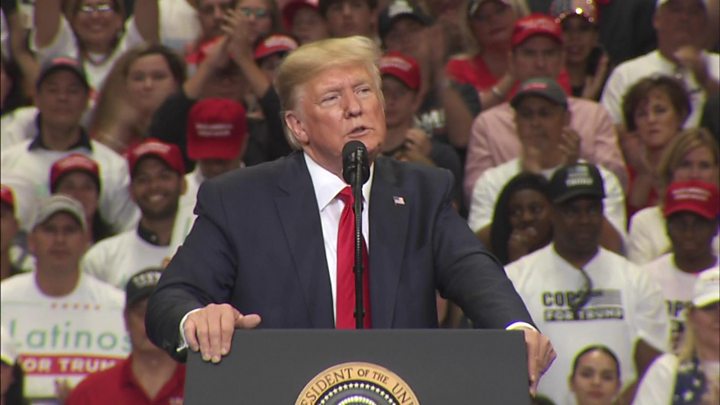
Media playback is unsupported on your device
US President Donald Trump has compared the deadly conflict between Turkish forces and Kurds in north-eastern Syria to a fight between children.
"Like two kids in a lot, you have got to let them fight and then you pull them apart," he told a rally in Texas.
Turkey has agreed to a US request to suspend operations so long as Kurdish fighters leave the border area.
Concern is growing about possible war crimes by Turkey and allied militia since the offensive began on 9 October.
- Turkey's Syria offensive explained in four maps
- Viewpoint: Syria could be beginning of end for Trump
President Recep Tayyip Erdogan moved against Kurdish forces in Syria after Mr Trump announced he was pulling US forces out of Syria's north-eastern border region with Turkey.
His aim is to push Kurdish militants, which Turkey regards as terrorists, away from northern-most Syria and create a "safe zone" for resettling up to two million Syrian refugees currently in Turkey.
Between 160,000 and 300,000 people are reported to have fled their homes since the fighting started, and there are fears the Turkish operation may lead to the ethnic cleansing of the local Kurdish population.
What exactly did Trump say?
As well as alienating the Kurds, who were instrumental in defeating the Islamic State group in Syria, Mr Trump has faced withering criticism from Republican allies over his decision to move US troops aside ahead of Turkey's invasion.
Earlier this week an extraordinary letter from Mr Trump to Mr Erdogan telling the Turkish leader not to "be a fool" emerged, with Turkish sources telling the BBC that Mr Erdogan binned the letter.
But on Thursday, in Texas, Mr Trump defended his handling of the crisis.
"It was unconventional what I did," he told his supporters. "I said they're going to have to fight a little while... They fought for a few days and it was pretty vicious."
Has the fighting stopped?
The Turkish-declared pause followed talks in Ankara between Mr Erdogan and Mr Trump's Vice-President, Mike Pence, on Thursday.
All fighting was to halt for five days and the US was to help facilitate the withdrawal of Kurdish-led troops from Turkey's "safe zone" along the border.
However, while the Kurds agreed to cease firing in the area between the border towns of Ras al-Ain and Tal Abyad, where combat had been fierce, they said that other areas had not been discussed.
Shelling and gunfire could again be heard in Ras al-Ain on Friday morning.
The Turks get what they wanted
The agreement brokered by the Americans does not define a "pause" in Turkish military operations but the US special envoy for Syria, James Jeffrey, said it meant no forward movement of troops on the ground, and no military action other than self-defence.
This applies to the swaths of Syrian land the Turks have invaded in the last week, about a quarter of the territory they ultimately want for a safe zone. Already they have forced some of the Kurdish fighters out but there are still pockets of strong resistance.
The Kurdish commander, General Mazloum Kobani, said the rest of his forces would retreat from this zone. But, he added, a ceasefire for other parts of the border would have to be discussed. Syrian soldiers have moved into much of it because the Kurds turned to Damascus for help after their US allies left.
The Syrians and their Russian backers were not at the negotiating table, so how they respond will help determine whether the agreement is sustainable. But for now it has essentially given the Turks what they were trying to achieve with the military operation: a zone on the Syrian side of the border, clear of Kurdish militias, that they control with their armed forces.
The Turks have agreed to make the "pause" permanent if the Kurdish fighters leave, but there is no demand for their soldiers to pull out.
Were war crimes committed?
Nearly 500 people have been killed since the offensive started, according to the Syrian Observatory for Human Rights (SOHR), a UK-based monitoring group.
These include 224 members of the Kurdish-led Syrian Democratic Forces and 183 Turkish-backed rebels but also 72 civilians, according to the SOHR.
Amnesty International says it has gathered "damning evidence of war crimes and other violations by Turkish forces and their allies".
It accuses them of carrying out summary executions and attacking civilians indiscriminately.
Hevrin Khalaf, a Kurdish female politician killed on 12 October, was dragged out of her car, beaten and shot dead by Turkish-backed Syrian fighters, Amnesty says.
In other attacks, children were killed by Turkish air strikes or mortars, the human rights group says.
"Turkish military forces and their allies have displayed an utterly callous disregard for civilian lives, launching unlawful deadly attacks in residential areas that have killed and injured civilians," said Kumi Naidoo, Amnesty's secretary general.
A spokesman for the UN High Commissioner for Human Rights warned earlier that summary executions were "serious violations" of international humanitarian law and could "amount to a war crime".
Turkish-backed fighters have denied responsibility for Khalaf's death. President Erdogan insists his operation is aimed at bringing peace to the region and should be welcomed internationally.
At least 20 people have been killed in Turkey by bombardment from Syria, including eight people in a single mortar attack by Kurdish militants, Turkish officials say, quoted by Reuters news agency.
https://www.bbc.com/news/world-middle-east-50094738
2019-10-18 09:35:14Z
52780401824835
Tidak ada komentar:
Posting Komentar